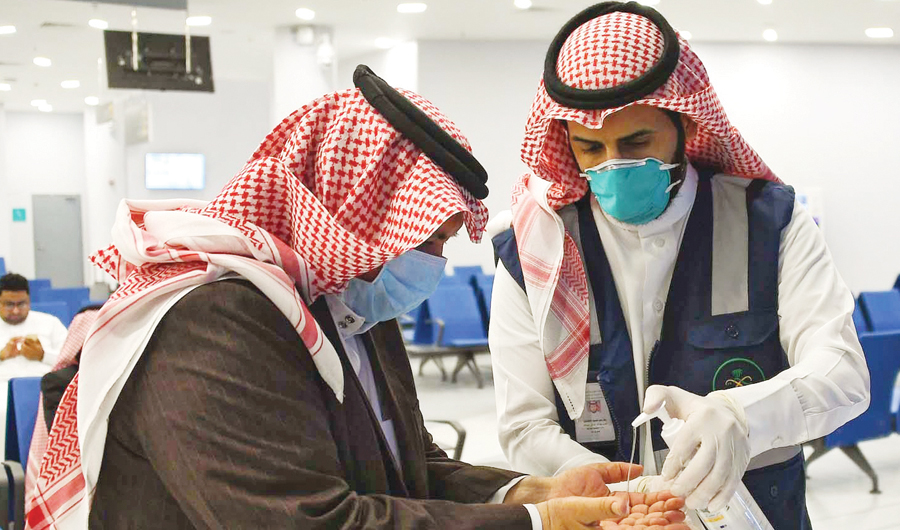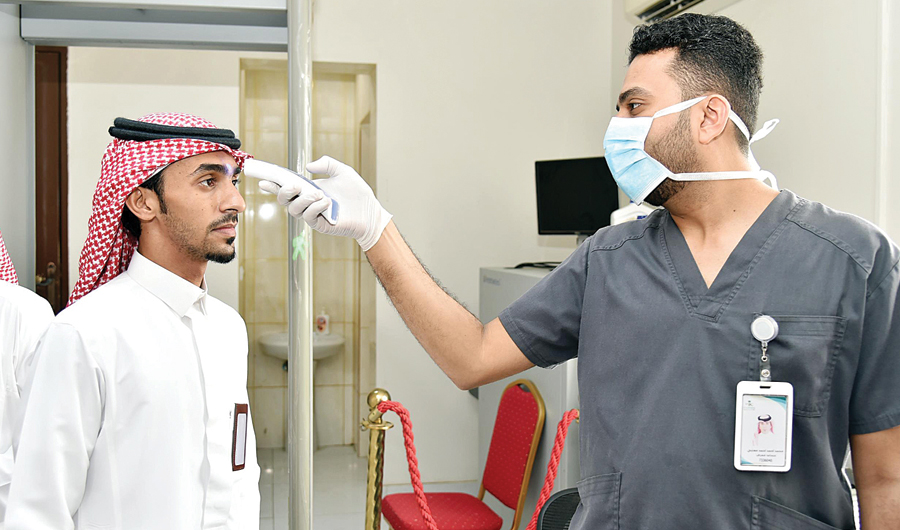JEDDAH: People in Saudi Arabia have “unjustifiably” emptied pharmacies of surgical face masks, despite experts stating that wearing them has not been proven to prevent the spread of coronavirus.
“It is true that many people have unjustifiably rushed to pharmacies in order to purchase face masks, despite it contradicting what is being announced by Health Ministry regarding the use of face masks,” Dr. Bandar Al-Amri, infectious diseases consultant at East Jeddah General Hospital, told Arab News.
“They are for in-hospital health practitioners when providing medical care to isolated patients, home-quarantined patients, and their health care providers. Masks may also transmit infection if medical precautions regarding how to wear, remove or dispense of them are not properly observed,” Al-Amri said.
He added that the same also applies to medical gloves, as there is no scientific evidence that wearing them in public places can prevent the transmission of microbes, including viruses.
Through Arab News, I would like to advise all to follow the instructions that the authorities provide about the new coronavirus, to protect us all until the virus is totally neutralized.
Dr. Bandar Al-Amri
“Like face masks, these gloves can be a source of dangerous microbial spread due to their exposure to contamination, and then they transfer microbes directly to the wearer when touching the nose, mouth or eyes. Many people also do not know how to wear them correctly and where to safely and properly dispose of them,” he said.
Al-Amri urged everyone to strictly adhere to instructions and directives published through official channels, especially the Saudi Health Ministry.
“Through Arab News, I would like to advise all to follow the instructions that the authorities provide about the new coronavirus, to protect us all until the virus is totally neutralized,” he said.
Public over-purchasing is already having negative affects on availability of goods like face masks and sanitizers.
Nahdi Medical Co., a leading chain of Saudi pharmacies, tweeted: “Due to the high and increasing demand for masks and alcohol-based sterilizers, which suppliers are having difficulty providing at local and global levels, we strive to provide them to you in our branches upon their arrival.”
Ahmed Mohammed, pharmacist, told Arab News that the fear that the virus had caused people to buy face masks hoping to protect themselves.
“People are experiencing this serious situation for the first time. They are afraid of coronavirus and that is why they are rushing to pharmacies to buy as many face masks as they can,” he said.
People are experiencing this serious situation for the first time. They are afraid of coronavirus and that is why they are rushing to pharmacies to buy as many face masks as they can.
A pharmacist
Mohammed told Arab News that the state of panic was not justified, as health experts had assured the public that masks were not necessary to prevent the spread of the virus.
“As you can see, I am not putting a mask on my face despite the fact that I receive hundreds of people with different health conditions (at my pharmacy) every day. The idea is that you should keep a distance of at least one meter between you and any other person, and always rub your hands with soap and water. I also avoid any sort of physical contact, such as shaking hands,” Mohammed said.
He noted that based on the recommendations of the World Health Organization (WHO) and the Saudi Health Ministry, only two kinds of people should wear face masks: Those with symptoms of disease, such as coughing, or those taking care of people with respiratory difficulties.
“As a pharmacist, I don’t ask my customers what they want the masks for, as everyone has his own reasons. However, with the ongoing outbreak of coronavirus, it is clear that many people still have misconceptions about face masks. Besides masks, they also ask for disinfectants, and this is good as these hand sanitizers are important to keep safe from the virus,” he said.
Schoolteacher Mansour Al-Shamrani, though, told Arab News that he wanted masks to keep his children safe when in crowded places.
“Such a product is always available in my home. Despite their high prices nowadays, I am more keen to have face masks for my children,” he said.
“I have so far searched for face masks in three different pharmacies. They all said they had no masks available,” he added.
According to the WHO, people can catch COVID-19 from others who have the virus. The disease can spread from person to person through small droplets from the nose or mouth, which are spread when a person with COVID-19 coughs or exhales.
These droplets land on objects and surfaces in proximity to the carrier, and other people then catch coronavirus by touching these objects or surfaces, then touching their eyes, noses or mouths. People can also catch coronavirus if they breathe in droplets from a person with coronavirus who coughs or exhales droplets close to them.
This is why “social distancing,” or keeping at least one meter away from a person who is sick, is vital to prevent the spread of the virus.
Christine Francis, consultant of infection prevention and control at the WHO, said that a healthy person only needs to wear a mask if they are taking care of a person with a suspected coronavirus infection.
“The WHO only recommends the use of masks in specific cases. If you have a cough, fever and breathing difficulties, you should wear a mask and seek medical care. If one does not have these symptoms, they don't have to wear masks because there is no evidence that they protect people who are not sick,” Francis said.
On its website, the WHO has posted precautions people can take to reduce the chances of being infected or spreading COVID-19. The list does not include masks in its coronavirus infection transmission precautions.






























